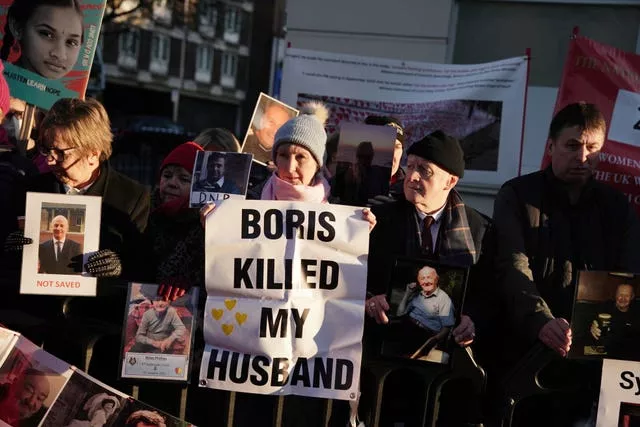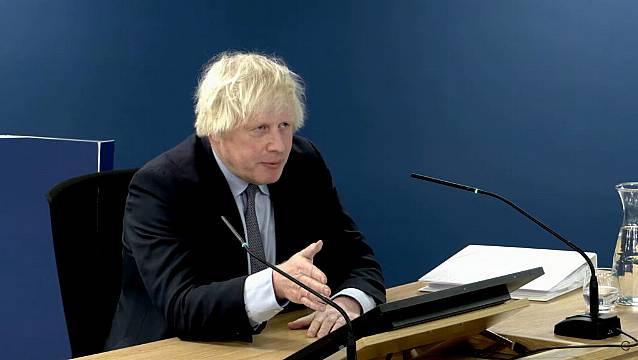Boris Johnson has said he takes personal responsibility for mistakes made in the handling of the pandemic as he apologised to victims at the UK Covid-19 Inquiry.
The former UK prime minister said his government should have “unquestionably” done things differently but insisted “we did our level best” in “very difficult” circumstances.
His highly-anticipated appearance was hit by protests as he began issuing an apology to victims of the pandemic.
Four people were removed from the hearing room after they held up signs reading: “The Dead can’t hear your apologies.”
“Can I just say how glad I am to be at this inquiry and how sorry I am for the pain and the loss and the suffering of the Covid victims,” Mr Johnson said.
He went on to acknowledge that his government made errors, saying: “So many people suffered, so many people lost their lives.
“Inevitably, in the course of trying to handle a very, very difficult pandemic in which we had to balance appalling harms on either side of the decision, we may have made mistakes.”
Mr Johnson also said: “I take personal responsibility for all the decisions that we made.”

Among the decisions he takes responsibility for are the speed of the UK government’s response to the pandemic in 2020, the lockdown decisions and their timeliness, the explosion of the virus in the residential care sector, the Eat Out to Help Out scheme, and the decision not to introduce a circuit-breaker later in 2020, he confirmed.
He said: “With hindsight, it may be easy to see things that we could have done differently, or it may be possible to see things that we could have done differently.
“At the time, I felt, and I know that everybody else felt, that we were doing our best in very difficult circumstances to protect life and protect the NHS.”
The only easy decision during the pandemic was to roll out the vaccines, Mr Johnson said.
He claimed he was “not sure” whether government decision-making had led to “materially” a larger number of excess deaths as a result of the pandemic.

Pressed repeatedly on why the UK had such a high rate of excess deaths – the second-worst in Europe after Italy – he cited “headwinds”, including an “extremely elderly population” with many health issues and being a “very densely populated country”, which “did not help”.
He defended the lockdowns as “very important” but acknowledged “there is no denying the damage that was done”.
Mr Johnson admitted he may have only read Scientific Advisory Group for Emergencies (Sage) minutes “once or twice”, adding that, in retrospect, “it may have been valuable” to have done so.
However, he said he relied on England’s chief medical officer Professor Sir Chris Whitty and former chief scientific adviser Sir Patrick Vallance who jointly chaired Sage.
Mr Johnson defended keeping former UK health secretary Matt Hancock in his post, despite calls from his aide Dominic Cummings that he should have been sacked.
He said Mr Hancock “may have had defects” but “I thought that he was doing his best in very difficult circumstances and I thought he was a good communicator”.

He was also grilled on what previous witnesses to the inquiry have described as a toxic atmosphere in Downing Street and the influence of Mr Cummings, his chief adviser at the time.
Mr Johnson said his No 10 was made up of “a lot of highly talented, highly motivated people who are stricken with anxiety about what is happening about the pandemic, who are doing their best and who, like all human beings under great stress and great anxiety about themselves and their own performance, will be inclined to be critical of others.”
Before Mr Johnson’s evidence commenced, Lady Hallett complained about the briefings to the press, saying that leaks of the witness statement undermined the process.
She said: “Failing to respect confidentiality undermines the inquiry’s ability to do its job fairly, effectively and independently.”
UK Home Office minister Chris Philp earlier joked “it’s the first time Boris has ever been early for anything” after the former prime minister arrived at the inquiry venue around three hours before the start of the hearing, meaning he avoided many of the protesters who gathered outside.







